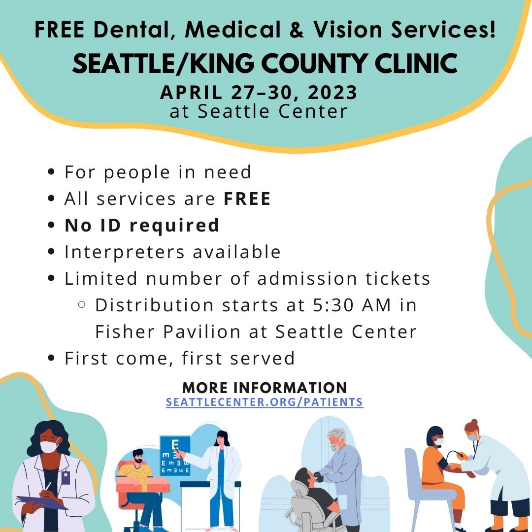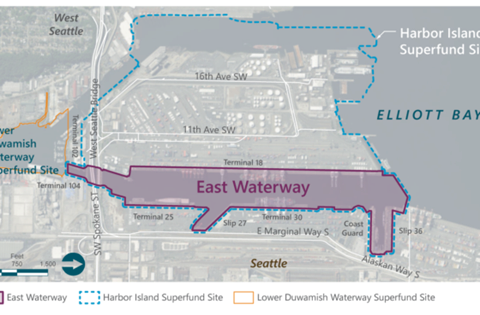Fire Department Obstructions and Pay Equity at Committee / Fair Chance Housing Still in Effect / Denim Day / Seattle/King County Clinic This Weekend / State Action on Gun Control, Behavioral Health, Abortion Access / EPA Releases East Waterway Cleanup Plan / Georgetown to Downtown Safety Project Helps South Park Access helps South Park Access / Free Produce Benefits for Seniors / Natural Gas Signs on Trucks
Contents
- Fire Department Obstructions and Pay Equity at Committee
- Fair Chance Housing Still in Effect
- Denim Day
- Seattle/King County Clinic This Weekend
- State Legislative Session Adopts Priority Bills on Gun Control, Behavioral Health, Abortion Access
- EPA Releases East Waterway Cleanup Plan: 60-day Public Comment Period Begins April 28
- Georgetown to Downtown Safety Project Helps South Park Access helps South Park Access
- Seniors – Apply for Free Produce Benefits
- Natural Gas Signs on Trucks to be Updated
Fire Department Obstructions and Pay Equity at Committee
At Tuesday’s Public Safety and Human Services (PSHS) Committee meeting, I introduced a bill sponsored by Councilmember Andrew Lewis and myself to add firefighters to the definition of “public officer” in the crime of obstructing a public officer. The current law only covers police officers, building code inspectors, and the Fire Marshall, but does not offer protections to fire fighters and emergency medical technicians in the line of duty.
At the committee, SFD Assistant Chief Lombard and Kenny Stuart (president of the local fire fighter union) spoke to the need for such an amendment to the Seattle Municipal Code. They shared how firefighters experienced threats, physical interference, and even assaults while attempting to provide life-saving aid.
Our firefighters rush into danger to protect our health and safety, whether from a fire, a car accident, or an overdose. The nature of their service response and their need to focus on a person receiving aid or a fire, makes it difficult to have defensive awareness of possible threats. Any interference can delay their service by a matter of life-or-death seconds.
I am grateful that Councilmember Lewis, Chief Scoggins, and the City Attorney’s Office have worked with me to develop this legislation, which is a common-sense fix to current laws that allow firefighters to focus on their work to make us all safer. The bill was unanimously supported by committee members with an amendment from Councilmember Mosqueda that would require the quarterly reporting of demographic information collected for individuals who receive citations for obstructing fire department employees.
The bill is scheduled to be heard in Full Council on May 9.
Wage Equity: At Tuesday’s committee meeting, we also discussed a draft resolution on wage equity for nonprofit human services workers. This follows a 3/14 presentation by UW-led researchers on their report, Wage Equity for Non-Profit Human Services Workers: A study of work and pay in Seattle and King County, which uncovered the 37% pay penalty for working in this field.
I believe the City of Seattle must do its fair share to increase wages for these mission-critical workers, or else we will continue to see empty classrooms and housing units, and people unserved, because workers cannot be found to take difficult jobs for such little pay. Central Staff analysis estimates a cost of just over $7M in 2024 to take the first step.
Many jurisdictions and levy proposals have already taken steps toward doing so for their workers:
The Mayor’s housing levy proposal includes significant funding to address workforce stabilization – including increased wages – for workers in permanent supportive housing.
All these efforts are needed, and each boosts wages for specific workers. None of them will increase wages for employees of the hundreds of nonprofit organizations who contract with the Human Services Department to provide a range of services, including support for survivors of gender-based violence, gun violence interruption, aging and caregiver support, food access, mentoring and educational support, and mental and behavioral health for families and kids.
That’s where the draft pay equity resolution comes in. It states Council’s intent to consider increasing wages for HSD-contracted workers and calls for recommendations from a workgroup comprised of public funders and private philanthropy toward addressing the pay penalty. It does not commit any funding; that will come during the Council’s budget deliberations in the fall.
I expect to formally introduce a resolution in early June, for a discussion and possible vote at the June 13th PSHS committee meeting.
Fair Chance Housing Still in Effect
A couple months ago, a panel of the 9th Circuit Court of Appeals issued a ruling on the Fair Chance Housing Ordinance (FCHO). The Court decided that the portion of the Ordinance banning landlords from asking tenants and applicants about criminal history is unconstitutional. However, the Court upheld the portion that bans landlords from taking adverse actions, such as denying housing based on criminal history.
The Seattle City Attorney’s office has asked the full court to rehear this decision. The timeline for the Court’s decision is unknown.
Until the appeal process concludes, the Fair Chance Housing Ordinance remains valid, and the Seattle Office for Civil Rights will continue to enforce the law.
If you have questions about Fair Chance Housing, either as a landlord or a hopeful tenant, you can email discrimination@seattle.gov or go to Fair Chance Housing – CivilRights | seattle.gov.
Fair Chance Housing creates…
- Safer communities, because housing reduces recidivism.
- Strong families, because half of our nation’s kids have at least one parent with a criminal background.
- Fairness, because punishing people who have served their time – or were never found guilty in the first place – is at odds with a just society. If you’ve served your time, you shouldn’t still be punished.
I would expect anyone in favor of a safer Seattle to support this law. You can learn more:
- Review the studies that support the policy as developed in the Fair Chance Housing ordinance.
- Watch my appearance on CNN to discuss Fair Chance Housing.
- Read my case for Fair Chance Housing at More Than a Contract – SMERCONISH.
Denim Day
This week, the Legislative Department donned denim to call attention to sexual assault. On April 26, millions of people across the world wear denim jeans with a purpose, to support survivors, and educate themselves and others about all forms of sexual violence.
The campaign began after a ruling by the Italian Supreme Court was overturned because the Justices felt that since the victim was wearing tight jeans, she must have helped the person who raped her remove her jeans, thereby implying consent. The following day, the women in the Italian Parliament came to work wearing jeans in solidarity with the victim. Learn more at Why Denim? — Denim Day.
There is STILL no excuse and never an invitation to rape. If you have experienced a sexual assault yourself, or want to know more about how to help your child, a friend, or someone else, contact King County’s 24/7 Resource Line.
Seattle/King County Clinic This Weekend
Do you or anyone you know struggle to access and/or afford healthcare? This weekend, free health, dental, and vision care are available at Seattle Center.
Need a ride?
State Legislative Session Adopts Priority Bills on Gun Control, Behavioral Health, Abortion Access
The State Legislature completed the 2023 regular session on April 23 and took action to adopt several bills included as priorities in the City’s State Legislative Agenda. Key bills include:
Gun control: A requirement for a 10-day waiting period and background check for gun purchases, a bill for which I gave testimony to support, and a ban on the manufacture, distribution, or sale of assault weapons. These bills build on last year’s successful action to ban high-capacity magazines and ghost guns.
Behavioral Health: House Bill 1134 will strengthen 988 and build a stronger response for folks experiencing a behavioral health crisis. I testified in support of HB 1134, which will decrease response times and ensure a highly-trained workforce is ready to take on crisis response jobs.
Abortion Access & Gender-Affirming Care: A suite of five bills will protect access to medical abortion; enhance data privacy for people who share their health information on apps; protect Washington patients and providers who may face legal threats from other states; protect providers’ licenses; and eliminate out-of-pocket costs to make abortion access more equitable. Unfortunately, the Keep Our Care Act, which would prevent hospital consolidation that restricts access to abortion, gender-affirming care, and end-of-life care, again failed.
EPA Releases East Waterway Cleanup Plan: 60-day Public Comment Period Begins April 28
The US Environmental Protection Agency released a proposed cleanup plan for the East Waterway. A 60-day public comment period begins on April 28. The cleanup area stretches one mile and covers 157 acres. It is located immediately downstream and north of the Lower Duwamish Waterway Superfund Site, along the east side of Harbor Island, as shown below:
The East Waterway is part of the larger Harbor Island Superfund Site and is one of several “operable units” placed on the EPA’s National Priorities List in 1983 due to high levels of PCBs, furans, and polycyclic aromatic hydrocarbons that accumulated over 150 years of urbanization and industrial development. The U.S. Environmental Protection Agency is overseeing the cleanup of the East Waterway to remove and remediate historical contaminants that threaten human and environmental health.
Here’s the proposed superfund site plan, including information on how to comment, or receive the plan in Spanish, Khmer, or Vietnamese.
Background information on the site is available from the EPA Harbor Island Website.
The East Waterway Group (the City, Port and County) maintains a website with additional information at https://eastwaterway.org . The site notes the East Waterway:
- Is one of the most active commercial waterways in the Pacific Northwest, supporting shipping and water-based industries; most vessel traffic consists of shipping container vessels and tugboats.
- Serves ecological functions as a deep-water estuary at the mouth of the Duwamish River.
- Is part of the Muckleshoot Indian Tribe’s and Suquamish Tribe’s usual and accustomed fishing area, with treaty-protected uses including a commercial fishery for salmon as well as ceremonial and subsistence uses.
- Provides public fishing access to the waterway from the Spokane Street Bridge. Learn more about safe seafood consumption In the East Waterway.
Georgetown to Downtown Safety Project Helps South Park Access
SDOT has reached 30% design to the Georgetown to Downtown Safety Project, and announced the update on SDOT’s blog. I was a sponsor of funding $5.2 million for the Georgetown to South Park Trail. Councilmember Morales was the prime sponsor.
hvt
There is a gap between the two projects in downtown Georgetown. My office checked in with SDOT and they noted that 2014 Bicycle Master Plan Network Map shows a potential segment that would potentially connect the two, though it is not funded in the current levy cycle.
The forthcoming Seattle Transportation Plan will incorporate the modal plans (e.g. pedestrian, bicycle, transit, and freight); a draft should be available in the coming months. Project prioritization could come at a later phase. The current Move Levy cycle runs through the end of next year.
Seniors – Apply for Free Produce Benefits
The Senior Farmers Market Nutrition Program (SFMNP) provides an $80 benefit card for the purchase of fresh fruits and vegetables at participating farmers markets and roadside stands. Learn more and apply here by May 19th.
Natural Gas Signs on Trucks to be Updated
Earlier this month, I joined environmental groups including 350 Seattle, the Sierra Club, Gas Leaks, and Breach Collective in calling for the removal of signs on Waste Management trucks to remove “powered by renewable natural gas” ads from their garbage trucks.
In February, those groups wrote to the City of Seattle and Attorney General Bob Ferguson requesting they address the misleading information, as the methane gas used comes directly from pipelines, most of which is fracked, although a small portion comes from landfills. Also known as biogas, “renewable natural gas” is methane captured from landfills, sewage treatment plants, and large dairies.
Later in April, Waste Management reached out to my office to say that they intend to work on language modification for the trucks.
Climate change efforts must be driven by science and misleading information has absolutely no place in the public sphere. I applaud the efforts to uncover how much Waste Management trucks are relying on fracked gas.
The joint statement from Seattle Public Utilities (which manages garbage contracts) and Waste Management, confirming the decision to remove the truck ads is copied below:
JOINT STATEMENT ON WM USE OF RNG AND REMOVAL OF TRUCK ADS
“Seattle Public Utilities (SPU) and Waste Management (WM) are committed to public health and a cleaner environment. In our work together for the collection of garbage, recycling and yard and food waste, we continuously look for ways to reduce waste and greenhouse gas emissions.
In 2019, SPU entered into two new Solid Waste collection contracts, one of which was with WM. The contract prioritizes cleaner solid waste collection fleet vehicles and specifies the following:
- WM’s primary collection fleet of vehicles consists of all new trucks with 2018 or newer near-zero emissions compressed natural gas (CNG) engines.
- WM’s initial electric fleet includes two EV Class 6 street crew trucks and eight EV support vehicles.
- WM uses the EPA’s Renewable Fuel Standard Program to allocate renewable natural gas (RNG) to their waste collection trucks.
WM is in compliance with the terms of this contract and fully satisfies the standards of EPA’s Renewable Fuel Standard Program. To avoid any confusion, SPU and WM have agreed to update the decals on WM collection vehicles in Seattle to better reflect our shared commitment to a cleaner environment.
WM is working as quickly as possible to update the trucks with its decal that will read, “Working together for a sustainable tomorrow”.
Each WM collection vehicle will need to be temporarily removed from service to remove the current decal and apply the new decal. SPU is committed to ensuring there is no impact to customers while the decal work is performed. The current timeline for completion is early fall.”
Posted: April 28th, 2023 under Councilmember Herbold











